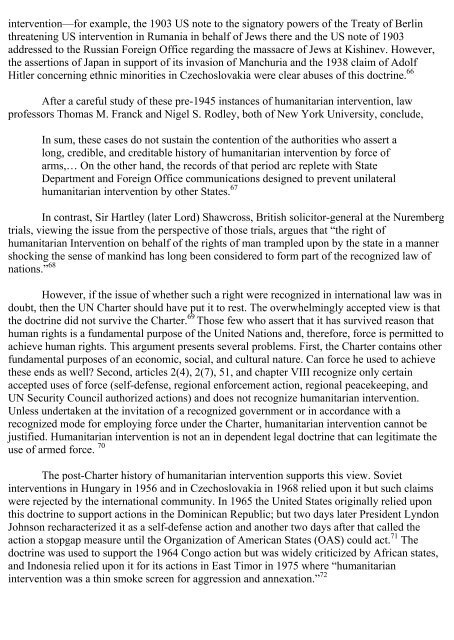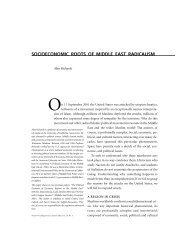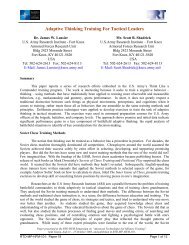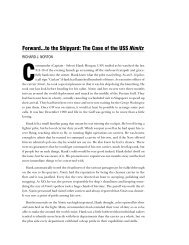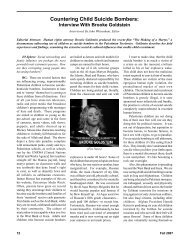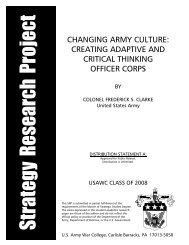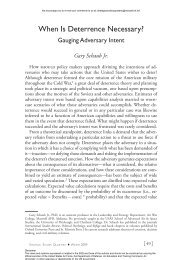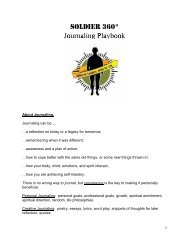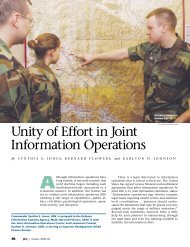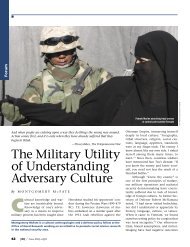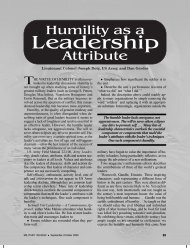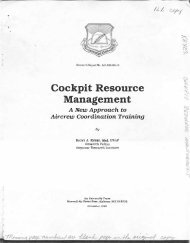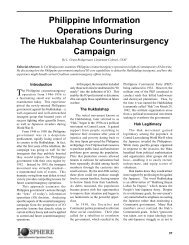Legitimate use of military force against state-sponsored - Air University
Legitimate use of military force against state-sponsored - Air University
Legitimate use of military force against state-sponsored - Air University
You also want an ePaper? Increase the reach of your titles
YUMPU automatically turns print PDFs into web optimized ePapers that Google loves.
intervention—for example, the 1903 US note to the signatory powers <strong>of</strong> the Treaty <strong>of</strong> Berlin<br />
threatening US intervention in Rumania in behalf <strong>of</strong> Jews there and the US note <strong>of</strong> 1903<br />
addressed to the Russian Foreign Office regarding the massacre <strong>of</strong> Jews at Kishinev. However,<br />
the assertions <strong>of</strong> Japan in support <strong>of</strong> its invasion <strong>of</strong> Manchuria and the 1938 claim <strong>of</strong> Adolf<br />
Hitler concerning ethnic minorities in Czechoslovakia were clear ab<strong>use</strong>s <strong>of</strong> this doctrine. 66<br />
After a careful study <strong>of</strong> these pre-1945 instances <strong>of</strong> humanitarian intervention, law<br />
pr<strong>of</strong>essors Thomas M. Franck and Nigel S. Rodley, both <strong>of</strong> New York <strong>University</strong>, conclude,<br />
In sum, these cases do not sustain the contention <strong>of</strong> the authorities who assert a<br />
long, credible, and creditable history <strong>of</strong> humanitarian intervention by <strong>force</strong> <strong>of</strong><br />
arms,… On the other hand, the records <strong>of</strong> that period arc replete with State<br />
Department and Foreign Office communications designed to prevent unilateral<br />
humanitarian intervention by other States. 67<br />
In contrast, Sir Hartley (later Lord) Shawcross, British solicitor-general at the Nuremberg<br />
trials, viewing the issue from the perspective <strong>of</strong> those trials, argues that “the right <strong>of</strong><br />
humanitarian Intervention on behalf <strong>of</strong> the rights <strong>of</strong> man trampled upon by the <strong>state</strong> in a manner<br />
shocking the sense <strong>of</strong> mankind has long been considered to form part <strong>of</strong> the recognized law <strong>of</strong><br />
nations.” 68<br />
However, if the issue <strong>of</strong> whether such a right were recognized in international law was in<br />
doubt, then the UN Charter should have put it to rest. The overwhelmingly accepted view is that<br />
the doctrine did not survive the Charter. 69 Those few who assert that it has survived reason that<br />
human rights is a fundamental purpose <strong>of</strong> the United Nations and, therefore, <strong>force</strong> is permitted to<br />
achieve human rights. This argument presents several problems. First, the Charter contains other<br />
fundamental purposes <strong>of</strong> an economic, social, and cultural nature. Can <strong>force</strong> he <strong>use</strong>d to achieve<br />
these ends as well? Second, articles 2(4), 2(7), 51, and chapter VIII recognize only certain<br />
accepted <strong>use</strong>s <strong>of</strong> <strong>force</strong> (self-defense, regional en<strong>force</strong>ment action, regional peacekeeping, and<br />
UN Security Council authorized actions) and does not recognize humanitarian intervention.<br />
Unless undertaken at the invitation <strong>of</strong> a recognized government or in accordance with a<br />
recognized mode for employing <strong>force</strong> under the Charter, humanitarian intervention cannot be<br />
justified. Humanitarian intervention is not an in dependent legal doctrine that can legitimate the<br />
<strong>use</strong> <strong>of</strong> armed <strong>force</strong>. 70<br />
The post-Charter history <strong>of</strong> humanitarian intervention supports this view. Soviet<br />
interventions in Hungary in 1956 and in Czechoslovakia in 1968 relied upon it but such claims<br />
were rejected by the international community. In 1965 the United States originally relied upon<br />
this doctrine to support actions in the Dominican Republic; but two days later President Lyndon<br />
Johnson recharacterized it as a self-defense action and another two days after that called the<br />
action a stopgap measure until the Organization <strong>of</strong> American States (OAS) could act. 71 The<br />
doctrine was <strong>use</strong>d to support the 1964 Congo action but was widely criticized by African <strong>state</strong>s,<br />
and Indonesia relied upon it for its actions in East Timor in 1975 where “humanitarian<br />
intervention was a thin smoke screen for aggression and annexation.” 72


